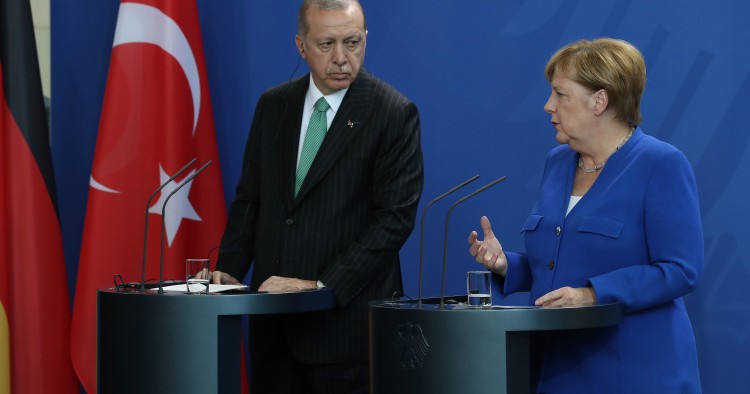The one good thing that has come out of the ongoing tension in Turkey-U.S. relations has been the rapprochement between Turkey and its key European allies. Europeans are critical of President Donald Trump’s decision to slap sanctions on Turkey over jailed American pastor Andrew Brunson at a time when Turkey’s economy is teetering. They are afraid of the repercussions of a Turkish economic collapse for their own countries. President Recep Tayyip Erdogan, for his part, saw what a dispute with the U.S. can do to his vulnerable economy when Trump’s decision sent the Turkish currency into free fall. With no immediate prospect of normalization with Washington, Erdogan now feels he must mend ties with the European countries that he called “Nazi remnants” not long ago to help his country’s ailing economy.
The Netherlands is one of those countries Erdogan recently exchanged barbs with, and is also Turkey’s biggest source of foreign investment. The two countries fell out over the Netherlands’ decision to bar Turkish officials from campaigning among the Turkish diaspora before the country’s April 2017 constitutional referendum. Erdogan told a crowd: “I said I thought Nazism was over, but I was wrong.” The Dutch government, he added, was made up of “Nazi remnants and fascists.” After the incident, the Netherlands withdrew its ambassador to Ankara and Turkey announced diplomatic relations would be maintained on the charge d’affaires level.
Turkey also had a bad year with its biggest trading partner Germany. Since the 2016 coup attempt, Erdogan has detained thousands of people, including journalists and human rights defenders with German links. In response, Germany threatened sanctions. Some Turkish military officers who are deemed to have been among the coup plotters sought asylum in Germany. Their extradition became another flashpoint in bilateral ties. Amid the tension, Turkey refused to allow a German political delegation to visit German troops at Turkey’s Incirlik air base, prompting German withdrawal from the air base. The row exploded when several German municipalities barred rallies by pro-Erdogan politicians. An angry Erdogan accused Germany of “fascist actions.”
To Erdogan, that is now all water under the bridge. He has bigger worries. The Turkish economy is on the verge of a crisis. The Turkish lira has lost a third of its value since the beginning of this year. Inflation is high. It is mostly of Erdogan’s own making, but the tension with the U.S. made things worse. Relations between Ankara and Washington hit rock bottom after the U.S. slapped sanctions on two top Turkish officials when Turkey failed to release the American pastor who had been jailed in Turkey on terrorism charges for almost two years. Congress has been intensifying pressure on Ankara as well. The Senate temporarily blocked the sale of American weapons to Turkey and approved legislation to restrict international loans over the pastor’s imprisonment and Turkey’s purchase of a Russian air defense system. Trump’s decision to slap sanctions sent the Turkish lira plummeting to a historic low. Threat of further U.S. sanctions has increased the risk to the Turkish economy. Turning to European partners is Erdogan’s best bet, so he has been on his best behavior.
He restored relations with the Netherlands, toned down his criticism of Europe, released most of the German nationals in Turkish jails, and even penned an opinion piece for a German newspaper ahead of his trip calling for a clean slate in relations and stronger economic ties. He is now on a bridge-building visit to Berlin. Erdogan hopes to receive financial support from Germany in case his economic troubles worsen. German Chancellor Angela Merkel got his hopes up when her government criticized the U.S. decision to impose sanctions on Turkey and warned that the collapse of the Turkish economy was in nobody’s interest.
But relations with Turkey are a tricky balancing act for Merkel at a time when she is losing support at home. She wants to avert an economic collapse in a country that has become Europe’s gatekeeper for migrants. Turkey and the EU signed a refugee deal in 2016 in an effort to stem the flow of Syrian refugees into Europe. An economic downturn, Merkel fears, might force Erdogan to scrap the deal and flood Europe with refugees at a time when anti-refugee sentiment is at an all-time high.
But getting too cozy with Erdogan gets her in trouble as well. Germany is home to some 3 million people with roots in Turkey and is struggling to integrate them. Erdogan is very popular among the Turks living in Germany, making German society wary of Erdogan and what they see as his authoritarian influence over the Turkish diaspora. Any government attempt to play nice with Erdogan prompts a strong reaction in Germany.
Many European leaders have similar dilemmas, making Erdogan’s task of finding financial aid difficult. Given how important Turkey’s stability is for Europe, European leaders might offer a helping hand if push comes to shove but it would not come without strings. Many demand that European leaders push Erdogan to address the deteriorating human rights situation in the country. How willing they are to push Erdogan’s hand on that remains to be seen. In the past, Europe proved that it could look the other way when Erdogan trampled the rule of law and destroyed freedom of press to secure his cooperation in matters essential to Europe. But offering financial aid without any conditions to Erdogan is too difficult to swallow for a European public that views him as an authoritarian leader. How German leaders deal with Erdogan on his recent visit will be a significant indicator of the road ahead.
Photo: Sean Gallup/Getty Images
The Middle East Institute (MEI) is an independent, non-partisan, non-for-profit, educational organization. It does not engage in advocacy and its scholars’ opinions are their own. MEI welcomes financial donations, but retains sole editorial control over its work and its publications reflect only the authors’ views. For a listing of MEI donors, please click here.













